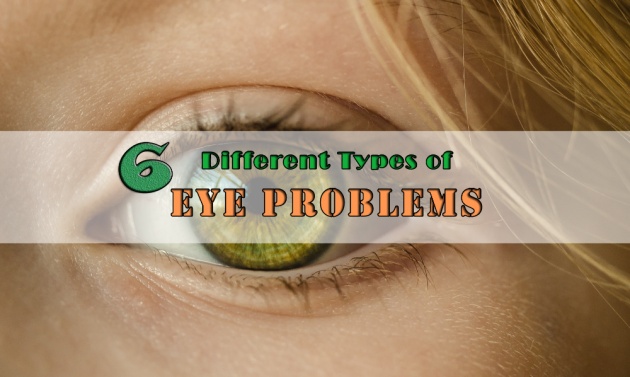
Image Credit: Skitterphoto via Pixabay / Edited with Photoshop
Without our eyes, we cannot see. So, it's safe to say that our eyes are one of our most important assets. This is the reason why we should take care of our eye health. However, that's easier said than done. Our eyes are one of the most complex organs of the body. It has many parts that must work together in order to produce clear vision. If one of them is compromised, you can expect to have problems with your eyesight. Here are just 6 of the most common types of eye problems many people experience today.
⚛ Refractive Errors ⚛
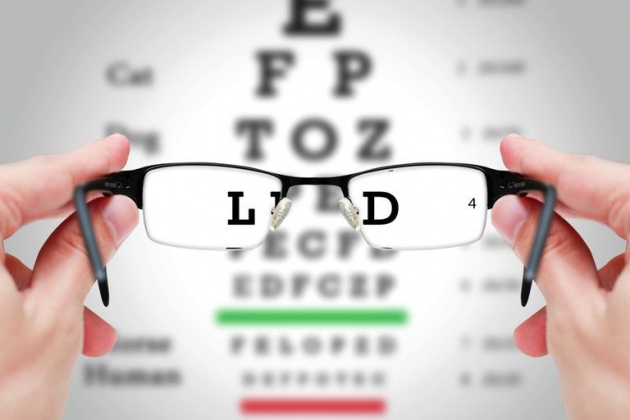
Image Credit: https://www.verywellhealth.com/
Refractive errors are the most common cause of eyesight problems according to the National Eye Institute. Refraction occurs when light passes through the cornea and lens of the eyes. If the cornea or lens is not perfectly round or smooth, an error may occur in the refraction of light as it will cause the light to bend unnaturally causing blurry vision. This eye condition can affect anyone at any age. However, aging does play a big factor. The older we get, the more likely it is for us to develop some sort of refractive error. Myopia (nearsightedness), hyperopia (farsightedness), presbyopia, and astigmatism are just some samples of refractive errors.
⚛ Treatment
The best way to treat or correct refractive error is through the use of prescription glasses or contact lenses. If you want a faster and more permanent solution, you may opt to have a refractive surgery such as LASIK.
⚛ Age-Related Macular Degeneration ⚛
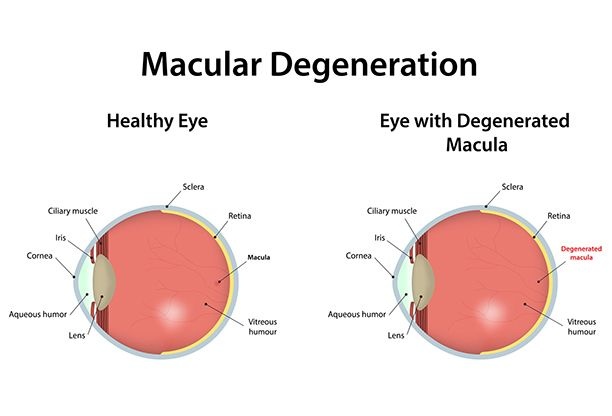
Image Credit: https://www.victoriahealth.com/
Age-related macular degeneration (AMD) is characterized as the gradual damage to the macula. It is also linked to most cases of blindness. It mostly affects people who are over 60 years old but other risk factors include smoking, genetics, and female gender.
⚛ Treatment
Unfortunately, there is no known cure for AMD as of the moment. However, it is possible to slow down the disease's progression. Some of the treatments available are the following.
- Anti-angiogenic drugs
- Laser therapy
- Photodynamic laser therapy
Certain vitamins and nutrients, such as beta-carotene, copper, zinc, and vitamins C and E, are known to help reduce the risk of vision loss for patients who are suffering from intermediate to advanced dry AMD.
⚛ Cataract ⚛
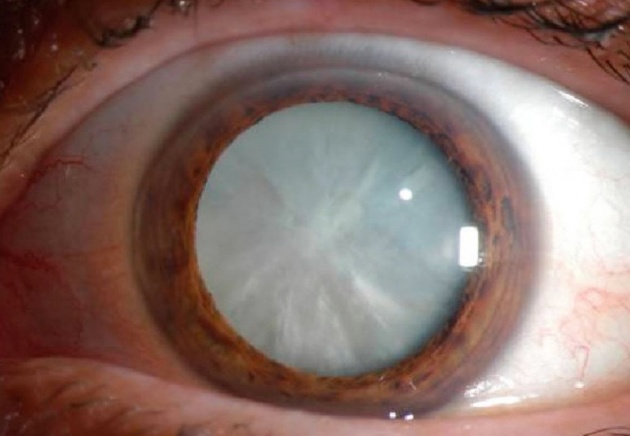
Image Credit: https://www.schefkindeyecare.com/
Cataract occurs when the lens develops a cloudy or milky substance that obstructs the vision more and more over time if left untreated. People with this eye condition often report seeing haloes around objects they are looking at. It commonly affects people who are over 50 years of age, but that doesn't mean people younger than that cannot develop one.
⚛ Treatment
Cataract can be treated through surgery. An artificial lens is attached to the eyes in replacement of the damage one.
⚛ Diabetic Retinopathy ⚛
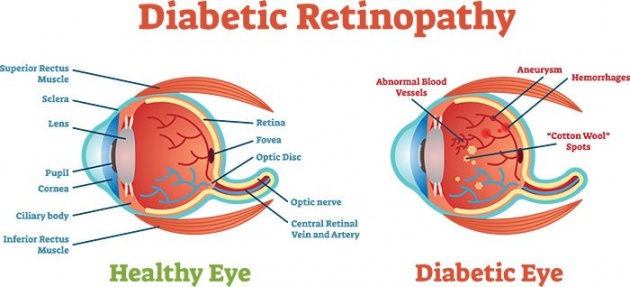
Image credit: https://www.aoa.org/
Diabetic retinopathy is a side effect of prolonged exposure to type 1 and type 2 diabetes. Too much blood sugar can alter the blood vessels at the back of the eyes which deprives the retina of essential nutrients causing damages to it. This often results in blurred vision and can even lead to blindness. Although all people with diabetes are at risk, the risk increases or decreases depending on the type of diabetes they have, how often their blood sugar fluctuates, and how they manage their sugar.
⚛ Treatment
Diabetic retinopathy can be treated through a laser surgery called laser photocoagulation. It can destroy or seal any leaking blood vessels found in the retina.
⚛ Keratoconus ⚛
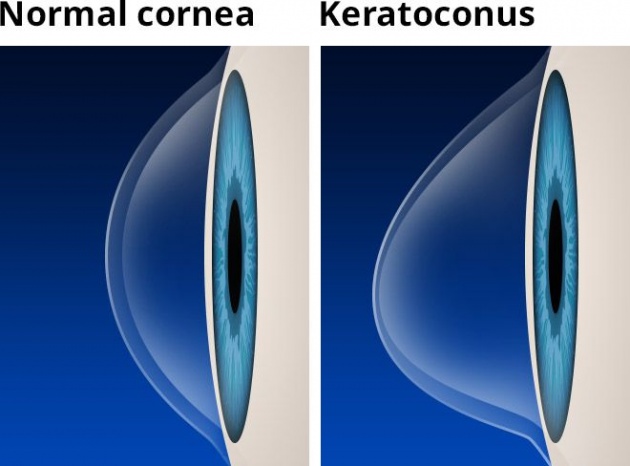
image Credit: https://www.allaboutvision.com/
A normal cornea has a round, dome shape. Pretty much like a ball. However, people with keratoconus have a more cone-shaped cornea. This is because this condition weakens the collagen that holds the cornea in place. If left untreated, it can cause serious vision problems. A cornea transplant may even be needed for more severe cases.
⚛ Treatment
There are several treatment options for keratoconus. Your eye doctor will start with a pair of glasses to help correct your condition. However, if you wish to wear contact lenses, a rigid gas permeable contact lens is a more sensible choice for you as it can add support to the weakened cornea. Cornea collagen crosslinking and Intacs are other effective ways to help slow down the progression of this eye condition. A cornea transplant is another option but is only utilized as a last resort.
⚛ Glaucoma ⚛
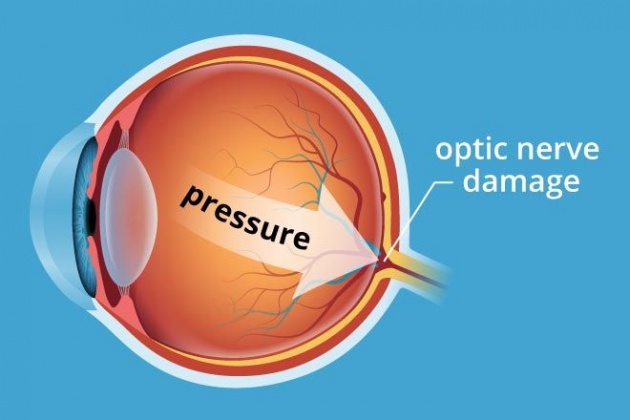
Image Credit: https://www.allaboutvision.com/
Glaucoma is an eye condition that only worsens over time. It is linked with a buildup of pressure inside the eye, which causes damages to the optic nerve of the eyes. The increased pressure, or intraocular pressure, is what damages the eye's optic nerve. And if the optic nerve continuously receive such pressure, glaucoma can cause permanent blindness. If you have a family history of glaucoma, you are at risk because it is usually inherited. However, just because you show no symptoms of this eye condition now doesn't mean you are safe from it. Glaucoma is slow to develop and may not show until much later in life. Most people also don't show any symptoms that they have this eye condition. This is why it's important to have your regular eye exam, especially when you are not so young anymore.
⚛ Treatment
Glaucoma can be treated in several ways as long as it is detected early. Some of the treatment options include lasers, eye drops, or surgery.
⚛ Concluding Thoughts ⚛
Some eye conditions are developed since birth, while others are acquired or inherited. Eye injuries can also cause eye health problems. Nobody is safe from developing one no matter your age. However, the elderly seem to be the most susceptible because, like every part of the human body, the eyes also age. This is why we need to regularly visit our eye doctor for a comprehensive eye exam, especially if we have a family history of eye problems. The health of our eyes is very important. We only have one pair, after all. Going blind is not an option, especially if it can be easily avoided with early detection.
~~oO0Oo~~oO0Oo~~oO0Oo~~
Thanks for reading! Have a wonderful day ahead of you and keep smiling. :)
Written by Chineyes for bitLanders
For more quality blog posts, you may visit my page
Not yet on bitLanders? Sign up now and be rewarded for sharing ideas, photos, and videos!



